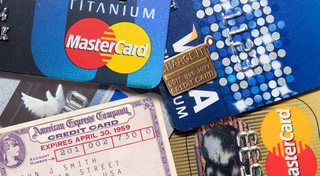Competition between payment cards and cash is growing. The possibility of coronavirus infection spreading through banknotes had an additional impact during the pandemic. What will happen to the cards in the future? Maybe the cards will replace cash or disappear altogether. Let's turn to history.

Competition between payment cards and cash is growing. The possibility of coronavirus infection spreading through banknotes had an additional impact during the pandemic. What will happen to the cards in the future? Maybe the cards will replace cash or disappear altogether. Let's turn to history.
The prototypes of payment cards appeared at the beginning of the 20th century. Cards were made from cardboard, later from metal. Diners Club was the first payment system to start issuing and promoting cards since 1949.
The first credit card was thought up by John C. Biggins, a banker, and innovative credit promoter. In 1946, he developed a lending scheme, and in 1951, Franklin National Bank issued the first-ever credit bank card.
Magnetic stripe or microprocessor cards
The search for a suitable material for making cards took decades. In 1969, IBM found the optimal solution — plastic with a magnetic stripe for storing data. The new technology has accelerated payment processing. The mass production of such cards began in the early 1970s. In Lithuania, the first card (Visa Classic, with a magnetic stripe) appeared only in 1993.
In the early 1990s, the development of plastic cards with smart chips began in Europe. In 1995, payment organizations Europay, MasterCard, and VISA created the international EMV technical standard for smart payment cards. The increase in cases of data theft from magnetic stripe was the reason to replace it with microprocessors until 2005. The task was entrusted to 11 companies around the world, including the Lithuanian company Penkių kontinentų bankinės technologijos (BS/2).
“Fraudsters have invented many ways to read data from magnetic stripe and duplicate card. It has led to the introduction of a safer technology. A chip embedded in the card acts like a miniature computer and uses dynamic data, unlike the magnetic stripe. So, the protection against unauthorized access is much higher,” says Kornelijus Šišla, BS/2 Head of Strategic Partnership.
Contactless cards
NFC technology (Near Field Communication, wireless data transfer between devices within a radius of 10 cm) was introduced in the early 2000s. Mastercard first tested contactless cards in 2003 to give consumers a simple way to pay. Subsequently, thanks to NFC technology, it became possible to pay with a smartphone.
In Lithuania, the ability to pay using NFC appeared in 2011, and the first contactless cards in 2016. In 2020, most of the cards issued in the country could be used to make both contact and contactless payments.
“The pandemic is driving adoption of contactless cards. Many countries have increased the limits for contactless payments without entering a PIN. In Lithuania, for example, from 25 to 50 euros,” says the BS/2 representative.
According to Swedbank, in 2020, more than half of all payments in Lithuania were made contactless.
Cards with keyboard
In 2009, Visa introduced a new type of bank payment card. It is equipped with a keypad and a display that shows a one-time payment confirmation code for additional protection.
Biometric payment cards
Recently, Mastercard and Samsung announced the release of a payment card that identifies the owner using a fingerprint.
Payment with such a card will be carried out even faster. No PIN code, just touch the fingerprint sensor on the card. Physical contact with the keyboard of the payment terminal is excluded, which is important in the pandemic.
Recycled plastic and wood cards
Sea turtles can live more than a hundred years in the ocean – and so can plastic waste. To allow customers to make a difference, U.S. Bank released recycled plastic cards with images of turtles.
Recently, banks around the world have been focusing on the responsible use of natural resources. British startup TreeCard has partnered with Mastercard to launch a wooden card. The company directs part of the transaction fees to tree planting projects.
Proponents of digital cards argue that it would be better for ecology to abandon physical cards. Research and Markets predict that the NFC market will grow by 14.2 percent annually.
“In my opinion, over the next 10 years, physical cards will be completely replaced by other payment methods and smart devices (phones, bracelets, rings, NFC stickers). Biometric data linked to bank accounts will also be used to authenticate the client,” forecasts Kornelijus Šišla.